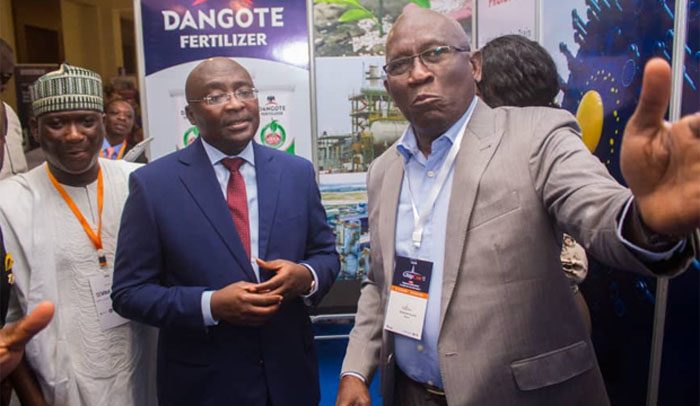Vice President Dr. Mahamudu Bawumia (M)
Nigeria and other sub-Saharan African countries would soon heave a sigh of relief from the importation of petroleum products, with the imminent completion of the 650,000 barrels-per-day (bpd) Dangote Refinery at Ibeju-Lekki area of Lagos.
Group Executive Director, Strategy, Capital Projects & Portfolio Development, Devakumar Edwin, made this statement on Wednesday, July 10, 2019, during the opening of the Ghana International Petroleum Conference (GhIPCON), which took place in Accra, Ghana.
This year’s conference held under the theme: ‘Regional Collaboration: A Catalyst for Transformation,” organised under the auspices of the Ministry of Energy and the National Petroleum Authority, was attended by stakeholders in the petroleum sector in West Africa.
Represented by the Technical Adviser to the President of Dangote Group on Refinery and Petrochemicals, Ign. Babajide Soyode, Mr. Edwin expressed the belief that the completion of Dangote Refinery and other modular refineries projects across West Africa, would lead to the integration of the downstream industries and stabilise the prices of petroleum products across the African sub-region.
He stressed the need for other investors in West Africa to emulate the investment drive of Aliko Dangote in the downstream petroleum sector and make the sub-region exporter of refined products.
He also urged investors in sub-saharan Africa to take the bull by the horn by investing in the downstream sector.
According to him, “If Dangote can do it, any investor can do it. Dangote has not waited for government to regulate the downstream sector before starting the construction of the refinery.”
“We don’t need foreign investors to turn around our downstream sector. African investors should be able to emulate Dangote and revive the African downstream petroleum industry,” he added.
He assured that the refinery is designed to process multiple grades of domestic and foreign crude, which can be converted into high-quality gasoline, diesel, kerosene, and aviation fuels that meet Euro V emissions specifications.
The facility, according to him, would be integrated with a petrochemical unit that will produce polypropylene and fertilisers.
Mr. Edwin said Nigeria would soon become the largest exporter of fertiliser in Africa as the Dangote Fertiliser Company is set to commence full production.
According to him, pre-commissioning activities have started while construction work is still on-going at the Dangote Refinery site.
Speaking also at the event, the Vice President of the Republic of Ghana, Dr. Mahamudu Bawumia, assured stakeholders in the petroleum downstream industry that government would create an enabling environment for downstream business to thrive competitively, efficiently and with the highest of safety standards.
“Government, through the Ministry of Energy is in the process of ensuring institutional and regulatory re-alignment of the midstream gas subsector to bring clarity and a degree of certainty to players within that subsector,” he said.
The GhIPCON is designed to actively bring to the fore the operating industry’s perspective and guidance on issues of governmental and regulatory policy, as well as best practices for the advancement of the industry across West Africa.
The conference witnessed a convergence of about 250 regulators and downstream industry stakeholders from across the West African sub-region and beyond.
The event stimulated regional discussions that set the tone for a West African policy framework on the outlook of the petroleum downstream industry, regulate petroleum downstream infrastructure projects, efficiency and financing.
Participants discussed whether or not West Africa was ready for IMO 2020 and fuel specification trends, making West African refineries work, tackling illicit activities, fuel fraud and supply chain security in the West African sub-region, as well as consumerising West Africa’s natural gas.
Topics discussed at the event included: Unlocking West Africa’s Deregulatory Inertia,Making West Africa’s Refineries Work, Ghana’s Cylinder Reticulation Model, Harmonsing Sub-Regional Petroleum Products Specifications, and Challenges of Regional Distribution of Petroleum Products’.

